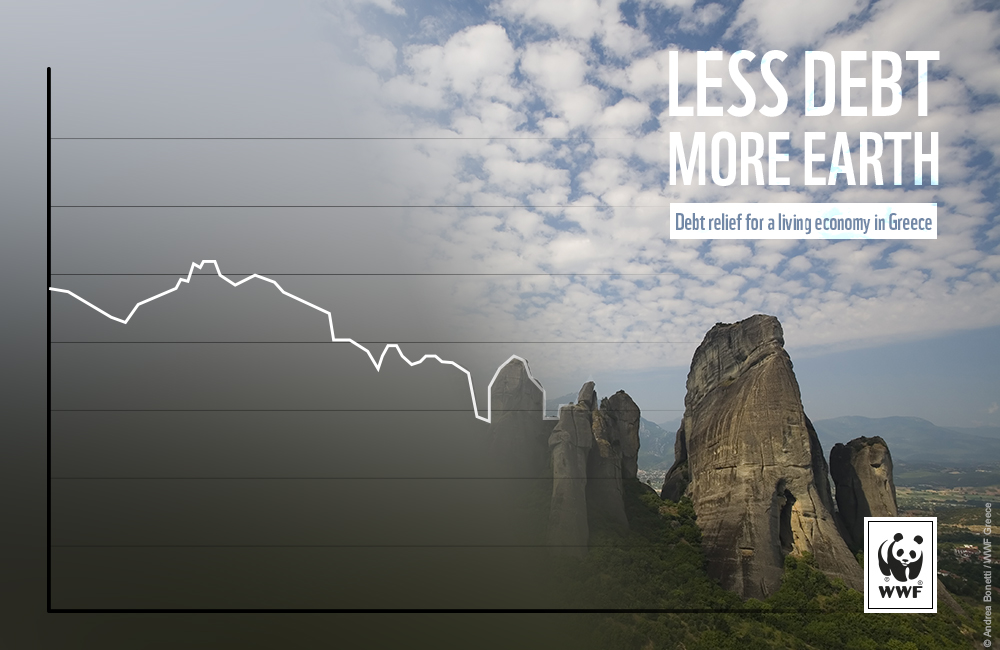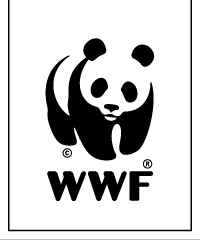WWF opens dialogue on green debt relief for a living economy in Greece
Wednesday, 02 November 2016
Seven years of crisis and austerity in Europe are placing great strain on the European project. In Europe’s nature, life goes on: Greece hosts a unique ecological treasury, which is threatened by increasing pressures for rapid but unsustainable growth and environmental deregulation. Greece’s debt can hardly be deemed sustainable and is crippling for the prospects of the country’s economy, environment and social well-being. This condition also prolongs the economic uncertainty of the entire euro-area. Debt relief seems inevitable. A green debt relief agreement, under the UN’s Sustainable Development Goals, can offer a long lasting solution to this European crisis.

Today, WWF released a discussion paper that aims to open a dialogue on the debt crisis and the agonizing quest for financial and ecological sustainability for the entire European Union. It is proposed that on the basis of a specific environmental agreement, substantial debt relief can be approved for Greece, thus restarting the country’s battered economy towards a more sustainable direction, while at the same time conserving globally significant biodiversity and contributing towards the achievement of key global sustainable development goals (SDGs). The discussion paper has been prepared by WWF Greece in collaboration with the New Economics Foundation.
Beyond the dramatic state of its finances, Greece is one of the European Union’s most important member states in terms of ecological wealth. In an age of climate change and growing ecological footprint, real economic stability can only be founded on a sound ecological basis. WWF believes that ecologically rich states need to be encouraged to sustainably manage the environment as a vitally significant common good, while at the same time linking the conservation of their unique natural wealth with the improvement of their economic status. Nature is the ‘capital’ Europe needs.
Through this discussion paper WWF proposes a series of measures for a) the conservation of Europe’s natural wealth, b) green economy, and c) revenue enhancement, while combating environmental crime, as the basis for a meaningful debt relief agreement. The agreement will also need to include good governance, economic development, green revenue enhancement and environmental crime combatting measures.
Although Greece has always been a laggard in its environmental policy track record, it is clear to WWF that the future for living economies in the entire European Union lies with conserving our common natural wealth and building on the added value which sustainable policies can bring to the economy and society. Addressing Greece’s debt overhang on the basis of an ecologically sound and socially vibrant economic agenda will benefit all and offer Europe a robust common vision for the future.
WWF’s call for a green way out of the dismal debt crisis is addressed to Greece’s creditor institutions and to the government and parliamentary parties of Greece. WWF is actively seeking feedback and collaboration from interested stakeholders on this basic concept. Depending on the outcomes of this dialogue, the organization is committed to working with others in further elaborating this proposal, if this can be of value to a possible agreement between Greece and its creditor institutions for meaningful debt relief and the pursuit of sustainability.
Statements:
Marco Lambertini, Director General, WWF International: “Imagine a situation where an unfolding economic crisis becomes the driving force for innovative thinking towards a greener, more equitable world. A world where crippling public debt is transformed into funding for the common good and where truly sustainable development begins to dominate the political agenda. This is precisely the world we at WWF want to imagine and hopefully strive towards, through initiatives such as this. After all, the role of solutions oriented, positive thinking organizations, like WWF, is to look beyond the limits and the ‘business-as-usual’ political paradigm, and seeks to re-define the agenda. Our role is to propose and support ideas that strive towards a better future for all life on Earth … us included!”
Demetres Karavellas, Director, WWF Greece: “If Europe had from the beginning of the crisis aimed for a brave green world of sustainable economic activity and social development, instead of austerity and constant transfer of the debt overhang to future generations, things would be very different now, not only in Greece but throughout this region. Using the economic crisis and the need for rapid growth as pretext, Greece is currently planning the construction of two heavily polluting and financially unviable coal power plants, while at the same time the European Commission has put into question its core nature protection legislation, treating the environment as an obstacle to development in difficult times. The time for meaningful action and change is now. Solving the crisis in a coherent and visionary way calls for brave and socially beneficial political decisions”.
NOTES TO EDITORS
Natural wealth as a foundation for sustainability
The ecological wealth and importance of Greece at the EU and the global level is enormous. The whole of Greece lies within the Mediterranean region, which is one of the world’s top biodiversity hotspots. Around 10% of the world’s vascular plants (25,000 species) are found in the Mediterranean Basin, i.e. an area representing only 1.6% of the Earth’s surface. More than half of these species are endemic. Its marine biome hosts 5.6% of the world’s marine animal taxa and 16.9% of the marine flora, in an area covering less than 1% of the world’s oceans.
Specific ecological characteristics for which Greece needs to take pride and step up efforts for their conservation, as important assets of Europe’s ecological treasury, are the following:
- Protected areas covering about 34% of the Greek territory.
- 10 wetlands of international importance (protected under the Ramsar Convention).
- With 419 sites, the Natura 2000 network covers 27,2% of the terrestrial and 6,1% of the marine area of Greece. Specifically: 239 Special Areas of Conservation and 2 Sites of Community Importance have been designated based on the EU’s Habitats Directive, and 202 Special Protection Areas based on the EU’s Birds Directive).
- Over 800 small wetlands on Greek islands, covering an area of more than 100 km2.
- Two archipelagos, the Aegean and Ionian, comprised of over 2,800 islands, only 227 of which are inhabited.
- Breathtaking landscapes with more than 250 mountains of altitudes higher than 1,000 metres.
- 16,000 kilometers of coastline.
- Approximately 47% of forest cover.
- 6,600 taxa of vascular plants.
- At least 40 local animal breeds.
- The Prespa Lakes host the world’s largest population of the Dalmatian Pelican and its surrounding lands are important for emblematic agricultural products, such as the Prespa beans.
- Sekania beach on Zakynthos hosts the largest density of loggerhead sea turtle nests in the Mediterranean while roughly half of the global population of the Mediterranean monk seal is found in Greek waters.
- The forest of Dadia in Evros offers vital habitat to 36 out of the 38 species of diurnal raptors that inhabit the European Union and is the basis for a local economy that benefits from nature tourism.
- The quality of 97.2% Greece’s bathing waters (marine and freshwater) is excellent.
According to the IUCN, Greece is one of the ecologically richest countries in the European Union. The country hosts 17.8% of the animal species present in Europe and has the highest number of endemics in Europe (22% of the total indigenous flora and 26% of the flora species of the Mediterranean). The fauna comprises 115 mammal species, 12 of which are marine, 446 bird, 22 amphibian and 64 reptile species. Moreover, Greece has the richest freshwater fish fauna of Europe with 162 species of which 83 are endemics. Greek seas host 476 marine fish species out of the 600 present in the Mediterranean. Some 30,000-50,000 invertebrates are also present, exhibiting a very high degree of endemism, which is higher than 50% in some groups. Due to its geography, geology and climate, Greece is characterized by high levels of endemism. Due to this large number of endemic species, many of European threatened species have been recorded.
Read here the discussion paper: “Debt relief for a living economy in Greece”
Visit our website and stay tuned: http://www.wwf.gr/lessdebtmoreearth/
Press Kit available here.
For media requests, please contact: Iasonas Kantas, Media officer, WWF Greece, +30 697 185 9632, This email address is being protected from spambots. You need JavaScript enabled to view it.
About WWF
WWF is one of the world’s largest and most experienced independent conservation organizations, with over 5 million supporters and a global network active in more than 100 countries.
WWF’s mission is to stop the degradation of the planet’s natural environment and to build a future in which humans live in harmony with nature, by conserving the world’s biological diversity, ensuring that the use of renewable natural resources is sustainable, and promoting the reduction of pollution and wasteful consumption.
About WWF Greece
WWF Greece is a national office of WWF’s global network. WWF Greece’s strategy aims to conserve critical places and species, address the ecological footprint of human activity and safeguard the environment from the impacts of the economic crisis.
About the New Economics Foundation
There has never been a greater need for a new economy or a more important moment to act than right now, because a storm that has been gathering for decades is firmly upon us.
Millions of people feel they have lost control over their lives and are now being left behind by changes in the economy, technology and climate, even while being promised a parody of control that threatens to make matters worse.
Yet, in the midst of all this upheaval, a surge of energy is being generated that can crack open new possibilities for change now, not at some distant point in the future.
The New Economics Foundation exists to drive this change and help give people the tools they need to take real control.
Share this



